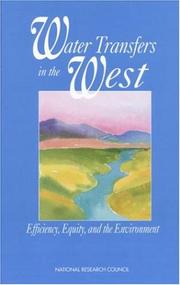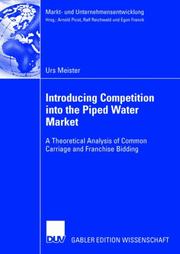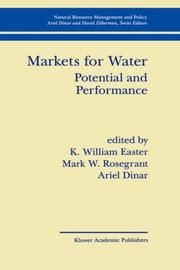| Listing 1 - 8 of 8 |
Sort by
|

ISBN: 0309045282 9786610203734 1280203730 0309563429 9780309563420 9780309045285 9781280203732 6610203733 Year: 1992 Publisher: Washington, D.C. : National Academy Press,
Abstract | Keywords | Export | Availability | Bookmark
 Loading...
Loading...Choose an application
- Reference Manager
- EndNote
- RefWorks (Direct export to RefWorks)
Water transfer --- Law and legislation --- Transfer of water --- Water export --- Water transportation --- Water-supply
Book
ISBN: 131618871X 1316190552 1108446736 1316209032 1316205363 131620166X 0511998066 131620717X 1316203530 1107012309 1322521786 9781316203538 9780511998065 9781107012301 Year: 2015 Publisher: Cambridge : Cambridge University Press,
Abstract | Keywords | Export | Availability | Bookmark
 Loading...
Loading...Choose an application
- Reference Manager
- EndNote
- RefWorks (Direct export to RefWorks)
The world is currently experiencing unprecedented global change, with population increase, urbanisation, climate change and environmental degradation combining to make management of freshwater resources a critical policy focus of the twenty-first century. This timely book designs and develops an original, analytical framework for water law reform processes, using case studies across four jurisdictions. Addressing the four principal areas of water law - integrated water resource management (IWRM) and river basin planning, water rights and allocation, water pollution and quality, and water services - this book provides a comprehensive study of water law, within the context of global and regional policy agendas. Case studies from England, Scotland, South Africa and Queensland, Australia, are presented, providing comparators from both common law and mixed jurisdictions, from the northern and southern hemispheres, and from developed and developing countries. A legislative framework is proposed for water law reform processes, and the consequences of different reform options are considered and investigated. A valuable resource for academics and graduate students in environmental law, resource management, hydrology and social science, this book is also highly relevant to policymakers, NGOs and legal practitioners.
Water --- Water resources development --- Water rights (International law) --- Water-supply --- Water transfer --- Integrated water development. --- Law reform. --- Legal reform --- Integrated development of water resources --- Water development, Integrated --- Water conservation --- Water use --- Transfer of water --- Water export --- Water transportation --- International law --- Law and legislation. --- Government policy. --- Laws and legislation
Book
ISBN: 0520386353 0520386345 Year: 2022 Publisher: University of California Press
Abstract | Keywords | Export | Availability | Bookmark
 Loading...
Loading...Choose an application
- Reference Manager
- EndNote
- RefWorks (Direct export to RefWorks)
Landlocked and surrounded by South Africa on all sides, the mountain kingdom of Lesotho became the world's first ";water-exporting country"; when it signed a 1986 treaty with its powerful neighbor. An elaborate network of dams and tunnels now carries water to Johannesburg, the subcontinent's water-stressed economic epicenter. Hopes that receipts from water sales could improve Lesotho's fortunes, however, have clashed with fears that soil erosion from overgrazing livestock could fill its reservoirs with sediment. In this wide-ranging and deeply researched book, Colin Hoag shows how producing water commodities incites a fluvial imagination. Engineering water security for urban South Africa draws attention ever further into Lesotho's rural upstream catchments: from reservoirs to the soils and vegetation above them, and even to the social lives of herders at remote livestock posts. As we enter our planet's water-export era, Lesotho exposes the possibilities and perils ahead.
Water resources development --- Water transfer --- Water-supply --- SOCIAL SCIENCE / Anthropology / General. --- Environmental aspects --- Availability, Water --- Water availability --- Water resources --- Natural resources --- Public utilities --- Water utilities --- Transfer of water --- Water export --- Water transportation --- Energy development --- water politics; export --- Lesotho Highlands Water Project. --- Lesotho Highlands Development Authority. --- Lesotho. --- Lesotho Highlands Water Scheme --- LHWP

ISBN: 3835092316 3835003828 Year: 2006 Publisher: Wiesbaden : Deutscher Universitats-Verlag,
Abstract | Keywords | Export | Availability | Bookmark
 Loading...
Loading...Choose an application
- Reference Manager
- EndNote
- RefWorks (Direct export to RefWorks)
Water scarcity is not exclusively a concern of the poor. Developed countries are increasingly facing problems related to higher per capita consumption and pollution so that enhancing the efficiency of the water supply ranks among the main global challenges of the future. The necessary improvements are not only a matter of technical progress but also of institutional design. Using tools of modern industrial economics, Urs Meister examines the effects of privatisation and competition in the piped water industry. Considering the two main approaches for competition in an industry with natural monopoly character, common carriage (interconnection) and franchise bidding (auctions), he analyses costs, retail prices and investment. Such analysis shows that competition may be a valuable opportunity to improve the efficiency of water supply.
Water transfer. --- Water-supply. --- Availability, Water --- Water availability --- Water resources --- Natural resources --- Public utilities --- Water resources development --- Water utilities --- Transfer of water --- Water export --- Water transportation --- Water-supply --- Globalization. --- Business. --- Emerging Markets/Globalization. --- Business and Management, general. --- Trade --- Economics --- Management --- Commerce --- Industrial management --- Global cities --- Globalisation --- Internationalization --- International relations --- Anti-globalization movement --- Markets. --- Management science. --- Quantitative business analysis --- Problem solving --- Operations research --- Statistical decision --- Public markets --- Fairs --- Market towns
Book
ISBN: 0833095137 0833090461 9780833095138 9780833090461 Year: 2016 Publisher: RAND Corporation
Abstract | Keywords | Export | Availability | Bookmark
 Loading...
Loading...Choose an application
- Reference Manager
- EndNote
- RefWorks (Direct export to RefWorks)
"This report assesses existing water market mechanisms (such as water banking and auctions) and partnership opportunities that Army installations can potentially use to improve installation water programs and their investments in water and wastewater systems. Because such mechanisms and opportunities depend on water management practices and water rights, the report also provides an overview of these areas. In addition, the report provides examples from across the United States, along with detailed case studies of these issues within Colorado and Fort Carson and within Arizona and Fort Huachuca. Water management today faces some key challenges, including aging infrastructure, water quality concerns, depleting groundwater aquifers, uncertain water supplies, pressures of population growth, climate change effects on water availability, and continued public demands for low-cost water. The traditional way of solving water problems -- by increasing access to new surface water and groundwater supplies--is often no longer viable. Such water sources are mostly allocated, and in many cases over-allocated. Today, many water managers are focused on conservation, efficient management, and accessing alternative water sources (such as treated wastewater and stormwater runoff). Water markets and partnerships are also being used in select cases. Given such water management, partnership, and market trends, the report concludes with recommendations about how Army policies and activities can be adjusted to improve installations' water security, programs, and infrastructure investments"--Publisher's description.
Water-supply --- Water transfer --- Water quality --- Water security --- Watershed management --- Climatic changes --- Military bases, American --- Economic aspects --- Management. --- Government policy --- Political aspects --- Environmental aspects. --- United States. --- American military bases --- Watershed development --- Watersheds --- Ecosystem management --- Security, Water --- Human security --- Freshwater --- Freshwater quality --- Marine water quality --- Quality of water --- Seawater --- Seawater quality --- Water --- Environmental quality --- Transfer of water --- Water export --- Water transportation --- Availability, Water --- Water availability --- Water resources --- Natural resources --- Public utilities --- Water resources development --- Water utilities --- Management --- Quality --- Composition --- U.S. Army --- US Army

ISBN: 0585320888 0792382560 Year: 1998 Publisher: Boston, Massachusetts : Kluwer Academic Publishers,
Abstract | Keywords | Export | Availability | Bookmark
 Loading...
Loading...Choose an application
- Reference Manager
- EndNote
- RefWorks (Direct export to RefWorks)
Markets for Water: Potential and Performance dispels many of the myths surrounding water markets and gives readers a comprehensive picture of the way that markets have developed in different parts of the world. It is possible, for example, for a water market to fail, and for the transaction costs in water markets to be excessive. Too often water trading is banned because the water resources have been developed with public funds and the water agencies do not want to lose control over water. There is also a concern that poor farmers or households will be disadvantaged by water trading. These concerns about public resources and the poor are not very different from those that have been voiced in the past about land sales. The problem is that in many cases the poor already have limited access to resources, but this limit is not due to water trading. In fact, water trading is likely to expand the access to water for many small-scale farmers. Markets for Water: Potential and Performance provides an analytical framework for water market establishment. It develops the necessary conditions for water markets and illustrates how they can improve both water management and economic efficiency. Finally, the book gives readers an up-to-date picture of what we have learned about water markets in a wide range of countries, from the US to Chile and India.
Water banking --- Water rights --- Water transfer --- Water-supply --- Economic aspects --- Economics. --- Environmental management. --- Environmental economics. --- Economics, general. --- Environmental Management. --- Environmental Economics. --- Management science. --- Economics --- Environmental quality --- Environmental stewardship --- Stewardship, Environmental --- Environmental sciences --- Management --- Quantitative business analysis --- Problem solving --- Operations research --- Statistical decision --- Economic theory --- Political economy --- Social sciences --- Economic man --- Environmental aspects --- Transfer of water --- Water export --- Water transportation --- Rights, Water --- Water --- Riparian rights --- Water trusts --- Availability, Water --- Water availability --- Water resources --- Natural resources --- Public utilities --- Water resources development --- Water utilities --- Law and legislation
Book
ISBN: 9783319161334 3319161326 9783319161327 3319161334 Year: 2015 Publisher: Cham : Springer International Publishing : Imprint: Springer,
Abstract | Keywords | Export | Availability | Bookmark
 Loading...
Loading...Choose an application
- Reference Manager
- EndNote
- RefWorks (Direct export to RefWorks)
This book aims at stimulating discussion between researchers working on state of the art approaches for operational control and design of transport of water on the one hand and researchers working on state of the art approaches for transport over water on the other hand. The main contribution of the book as a whole is to present novel perspectives ultimately leading to the management of an envisioned unified management framework taking the recent advances from both worlds as a baseline. The book is intended to be a reference for control-oriented engineers who manage water systems with either or both purposes in mind (transport of water, transport of goods over water). It highlights the possible twofold nature of water projects, where water either acts as primary object of study or as a means. The book is dedicated to comparing and relating to one another different strategies for (operational) management and control of different but strongly related systems in the framework of the water. In that sense, the book presents different approaches treating both the transport of water and transport over water. It compares the different approaches within the same field, highlighting their distinguishing features and advantages according to selected qualitative indices, and demonstrates the interaction and cross-relations between both fields. It will also help to determine the gaps and common points for both fields towards the design of such a unifying framework, which is lacking in the literature. Additionally, the book looks at case studies where the design of modeling/control strategies of either transport of water or transport over water have been proposed, discussed or simulated.
Economics/Management Science. --- Operation Research/Decision Theory. --- Production/Logistics/Supply Chain Management. --- Water Industry/Water Technologies. --- Economics. --- Operations research. --- Economie politique --- Recherche opérationnelle --- Management --- Business & Economics --- Agricultural Economics --- Management Theory --- Business. --- Water-supply. --- Production management. --- Decision making. --- Business and Management. --- Operations Management. --- Operations Research/Decision Theory. --- Operational analysis --- Operational research --- Industrial engineering --- Management science --- Research --- System theory --- Manufacturing management --- Industrial management --- Water transfer. --- Shipping. --- Marine shipping --- Marine transportation --- Maritime shipping --- Ocean --- Ocean traffic --- Ocean transportation --- Sea transportation --- Shipping industry --- Water transportation --- Communication and traffic --- Marine service --- Transportation --- Merchant marine --- Transfer of water --- Water export --- Water-supply --- Economic aspects --- Availability, Water --- Water availability --- Water resources --- Natural resources --- Public utilities --- Water resources development --- Water utilities --- Deciding --- Decision (Psychology) --- Decision analysis --- Decision processes --- Making decisions --- Management decisions --- Choice (Psychology) --- Problem solving --- Decision making --- Water. --- Hydrology. --- Operations Research and Decision Theory. --- Aquatic sciences --- Earth sciences --- Hydrography --- Water --- Hydrology
Book
ISBN: 0520261976 9786612422300 0520945379 1282422308 9780520945371 9780520261976 Year: 2010 Publisher: Berkeley University of California Press
Abstract | Keywords | Export | Availability | Bookmark
 Loading...
Loading...Choose an application
- Reference Manager
- EndNote
- RefWorks (Direct export to RefWorks)
An ecosystem in freefall, a shrinking water supply for cities and agriculture, an antiquated network of failure-prone levees-this is the Sacramento-San Joaquin Delta, the major hub of California's water system. Written by a team of independent water experts, this analysis of the latest data evaluates proposed solutions to the Delta's myriad problems. Through in-depth economic and ecological analysis, the authors find that the current policy of channeling water exports through the Delta is not sustainable for any interest. Employing a peripheral canal-conveying water around the Delta instead of through it-as part of a larger habitat and water management plan appears to be the best strategy to maintain both a high-quality water supply and at the same time improve conditions for native fish and wildlife. This important assessment includes integrated analysis of long term ecosystem and water management options and demonstrates how issues such as climate change and sustainability will shape the future.Published in cooperation with the Public Policy Institute of California
Delta Region (Calif.) -- Environmental conditions. --- Environmental management -- California -- Delta Region. --- Estuarine ecology -- California -- Delta Region. --- Water diversion -- Environmental aspects -- California -- Delta Region -- Forecasting. --- Water quality management -- California -- Delta Region. --- Water-supply -- California -- Delta Region -- Forecasting. --- Water-supply -- California -- Delta Region -- Management. --- River engineering --- Water transfer --- Environmental Engineering --- Hydraulic Engineering --- Mechanical Engineering --- Civil & Environmental Engineering --- Engineering & Applied Sciences --- Delta Region (Calif.) --- Environmental conditions. --- Water quality management --- Estuarine ecology --- Water-supply --- Water diversion --- Environmental management --- Forecasting. --- Environmental aspects --- Management. --- Environmental stewardship --- Stewardship, Environmental --- Availability, Water --- Water availability --- Water resources --- Diversion of water --- Estuaries --- Water quality --- Water quality control --- Ecology --- Management --- Sacramento River (Calif.) --- Sacramento River Delta (Calif.) --- Sacramento-San Joaquin Delta (Calif.) --- San Joaquin River (Calif.) --- San Joaquin River Delta (Calif.) --- San Joaquin-Sacramento Delta (Calif.) --- Delta --- Engineering, River --- Hydraulic engineering --- Water resources development --- Transfer of water --- Water export --- Water transportation --- Flood control --- Water use --- Natural resources --- Public utilities --- Water utilities --- Brackish water ecology --- Sewage disposal --- Water conservation --- Environmental sciences --- Sacramento-San Joaquin Estuary (Calif.) --- Sacramento River Estuary (Calif.) --- San Joaquin River Estuary (Calif.) --- San Joaquin-Sacramento Estuary (Calif.)
| Listing 1 - 8 of 8 |
Sort by
|

 Search
Search Feedback
Feedback About UniCat
About UniCat  Help
Help News
News